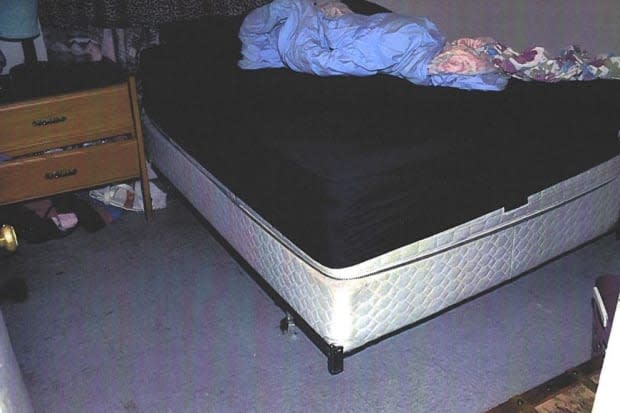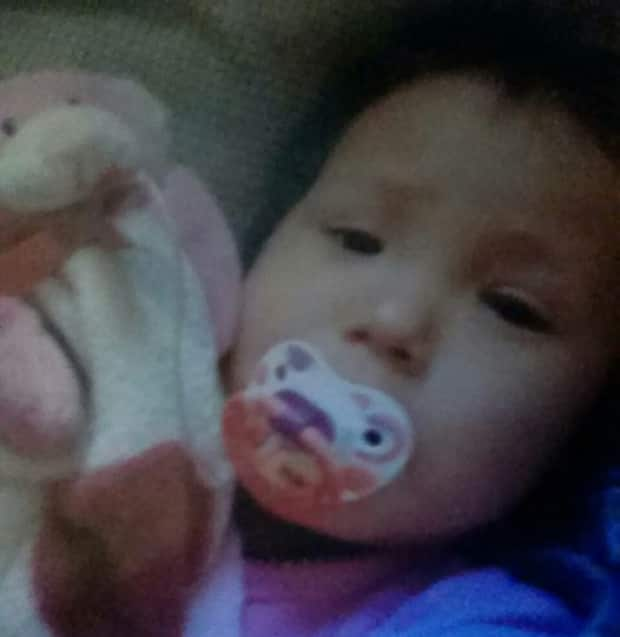Trial resumes for Edmonton mother accused of killing her 5-year-old daughter
After a lengthy delay, the Lauren Lafleche second-degree-murder trial has resumed in Edmonton.
The judge-alone proceeding was supposed to continue two weeks ago, but was put on hold after Lafleche tested positive for COVID-19. She is not in custody.
Lafleche is accused of causing a severe head injury that led to the death of her daughter Shalaina Arcand.
The 34-year-old mother who has two other children is also accused of assaulting Shalaina with a belt and a spatula and failing to provide her with the necessaries of life.
Shalaina was in care at a number of different foster homes for four years, but was returned to her mother six months prior to her death.
In October 2015, the five-year-old was rushed unconscious to the Stollery Children's hospital in the middle of the night.
The trial has already heard that Lafleche delayed calling 911 while she and her oldest daughter gave Shalaina a warm bath to try and wake her up.
"She was already in grave condition and critically ill," pediatrician Dr. Melanie Lewis testified on Tuesday. "Shortly after arrival, she had a cardiac arrest."
Lewis did not treat Shalaina, but reviewed all medical reports to testify as an expert witness for the Crown about physical abuse, head trauma and neglect.
"She suffered a devastating severe brain injury that ultimately led to her death," Lewis testified. "This would have taken an incredible amount of force to cause this head injury."
Court of Queen's Bench Justice Avril Inglis was told during the trial last November that the accused explained to her other daughter that Shalaina's injury was caused by a fall out of bed.

Lewis rejected that explanation.
"The injury that ultimately led to Shalaina's demise cannot be explained by a fall of two-and-a-half feet," the pediatrician said. "A fatal injury due to a fall in general must be more than four storeys."
Lewis testified Shalaina's head injury would be the type doctors typically see following a high-speed motor-vehicle collision.

Lewis also noted other non-fatal injuries that Shalaina had suffered including unusual wounds to her neck, old injuries to her liver and kidney and bruises on her chest and abdomen. She thought they could have been an indication of long-standing maltreatment and neglect.
During cross-examination, Lewis also rejected the idea that Shalaina's fatal head injury could have been caused by a fall from playground monkey bars a few days before she was rushed to hospital.
"Within seconds, she would have been symptomatic with this brain injury," Lewis told defence lawyer Peter Royal.
Royal noted that Lafleche had complained about changes in her daughter's behaviour after the playground incident, including headaches and loss of appetite.
"That could be a sign of a concussion," Lewis testified. "This was likely the result of an inflicted head injury [caused by] hitting her head against a fixed surface."
'We have a desperately-ill child'
Dr. Keith Aronyk also testified Tuesday as an expert witness for the Crown. The pediatric neurosurgeon performed emergency brain surgery on Shalaina soon after she was admitted to hospital.
As he recalled the rushed decision to try to save the little girl's life, Aronyk testified, "We have a desperately-ill child."
She was no longer breathing on her own and had to be intubated soon after she was admitted to hospital, he said. Her heart was stopping, but she survived the surgery.
During surgery, Aronyk found a clot of blood inside her head that he believed fit into the window of being three days old. He told the trial that in his clinical opinion, the clot was likely one day old, indicating that the injury had occurred within the last day.
After the surgery was completed, Aronyk told another doctor he didn't expect Shalaina to live and noted that if she did, she would likely suffer irreversible brain damage.
The little girl died in hospital three days later without regaining consciousness.
The trial continues.

